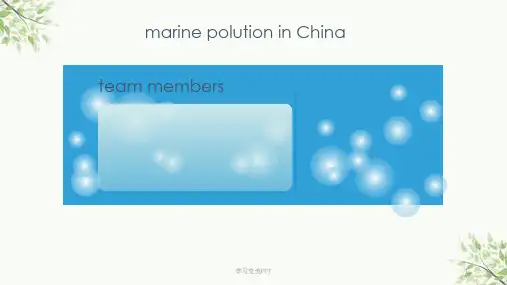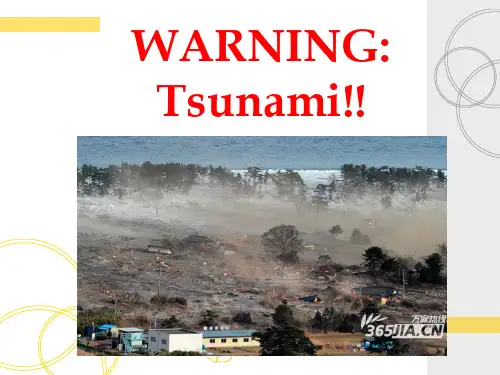沉静如海英文演讲课件
- 格式:ppt
- 大小:2.04 MB
- 文档页数:21


Ladies and gentlemen,Good morning/afternoon/evening. Today, I stand before you to speak about the ocean, that vast and mysterious body of water that covers more than 70% of our planet. The ocean is not just a geographical feature; it is a living entity that plays a crucial role in sustaining life on Earth. It is a treasure trove of life and a source of inspiration for humanity. In this speech, I will explore the importance of the ocean, the challenges it faces, and the role we all play in preserving its beauty and vitality.First and foremost, the ocean is the cradle of life. It is estimatedthat more than half of the oxygen we breathe comes from the ocean. The ocean's vast ecosystem supports a multitude of life forms, from the tiniest plankton to the majestic blue whale. This interconnected web of life ensures the balance and health of our planet. Coral reefs, for example, are home to more than 25% of all marine species, making them one of the most biodiverse habitats on Earth.The ocean also provides essential services that are vital for our survival. It regulates the Earth's climate by absorbing carbon dioxide, a greenhouse gas that contributes to global warming. Additionally, the ocean currents distribute heat around the planet, influencing weather patterns and temperature. Without the ocean's climate-regulating abilities, our planet would be a much less hospitable place.Furthermore, the ocean is a significant source of food and livelihoodfor millions of people. Fish and seafood are a vital part of the diets of billions, and the fishing industry employs millions around the world. The ocean also provides us with renewable energy sources, such as tidal and wave power, which have the potential to reduce our dependence on fossil fuels.Despite its importance, the ocean faces numerous challenges. One of the most pressing issues is overfishing, which has led to the depletion of many fish stocks. The destruction of habitats, such as coral reefs and mangroves, also threatens the survival of numerous marine species. Pollution, whether from industrial waste, plastic debris, or oil spills, poses a significant threat to marine life and human health.Another critical challenge is climate change. Rising sea levels, increased ocean temperatures, and changing weather patterns are altering the marine ecosystem and threatening the livelihoods of coastal communities. The ocean's ability to regulate climate is being compromised, and this has far-reaching consequences for all life on Earth.As students, we have a unique opportunity to contribute to the preservation of the ocean. Here are some ways in which we can make a difference:1. Raise Awareness: We can educate our peers and communities about the importance of the ocean and the threats it faces. By raising awareness, we can encourage others to take action.2. Reduce, Reuse, Recycle: We can adopt a more sustainable lifestyle by reducing our plastic consumption, reusing products, and recycling whenever possible. This will help reduce the amount of plastic that ends up in the ocean.3. Support Sustainable Practices: We can support businesses and organizations that adopt sustainable fishing and seafood practices. By purchasing sustainably sourced seafood, we can help reduce overfishing and protect marine ecosystems.4. Volunteer: We can participate in clean-up efforts and conservation projects to help protect marine habitats and restore damaged ecosystems.5. Advocate for Change: We can use our voices to advocate for stronger policies and regulations that protect the ocean. This may involvewriting to our elected officials or participating in peaceful protests.The ocean is a source of inspiration for many. Its beauty, vastness, and mystery have captivated artists, writers, and thinkers throughout history. The ocean has inspired countless songs, poems, and novels, and it continues to inspire us today.In conclusion, the ocean is a vital part of our planet and our lives. It is a treasure trove of life and a source of inspiration. However, it isunder threat from overfishing, pollution, and climate change. As students, we have a responsibility to protect the ocean and ensure that it remains a thriving ecosystem for future generations. Let us work together to preserve the ocean's beauty and vitality, so that it may continue to be a source of wonder and sustenance for all.Thank you for your attention.。








